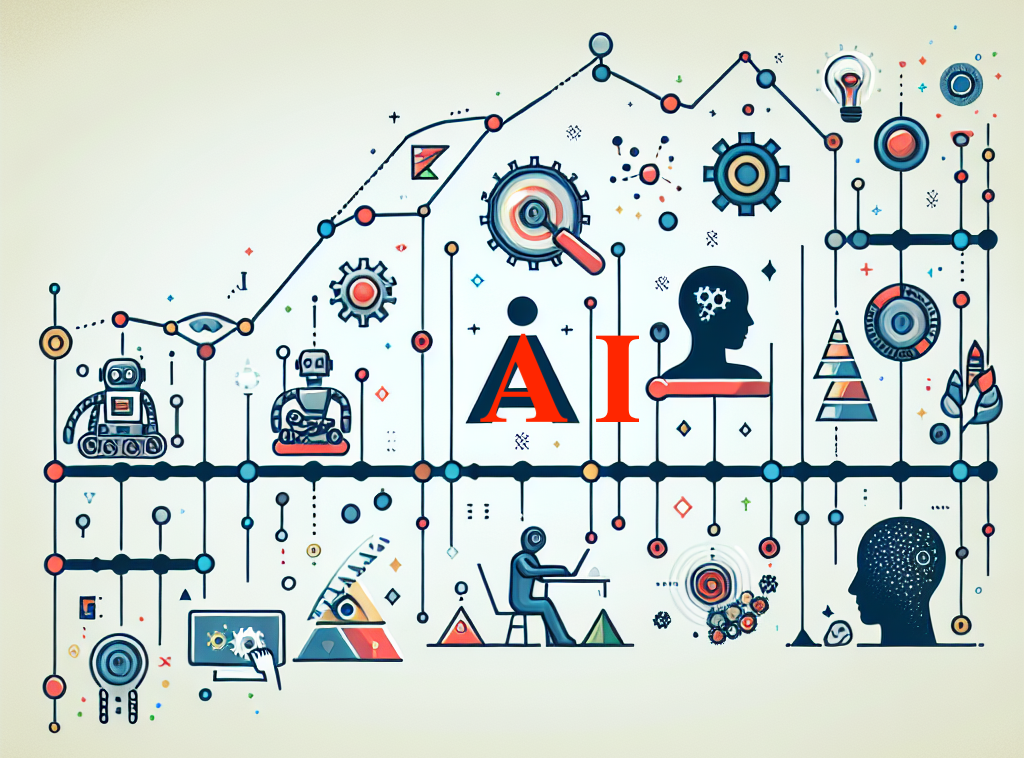A Brief History of Artificial Intelligence

Artificial Intelligence (AI) has evolved significantly since its inception in the mid-20th century. This blog post traces the fascinating journey of AI from its early days to the present, highlighting key milestones and breakthroughs along the way.
1950s: The Birth of AI
- 1950: Alan Turing publishes "Computing Machinery and Intelligence," introducing the Turing Test, a criterion for determining whether a machine exhibits human-like intelligence.
- 1956: The Dartmouth Conference, organized by John McCarthy, Marvin Minsky, Nathaniel Rochester, and Claude Shannon, marks the official birth of AI as a field of study. The term "Artificial Intelligence" is coined.
1960s: Early Research and Optimism
- 1961: The first industrial robot, Unimate, is introduced, revolutionizing manufacturing processes.
- 1966: Joseph Weizenbaum develops ELIZA, an early natural language processing computer program capable of mimicking human conversation.
1970s: The First AI Winter
- 1972: The programming language PROLOG is developed, which becomes widely used in AI research.
- 1974-1980: The first AI winter occurs due to high expectations and limited technological progress, leading to reduced funding and interest.
1980s: Expert Systems and Renewed Interest
- 1980: The introduction of expert systems, such as XCON, which assist in decision-making processes in specific domains.
- 1987-1993: The second AI winter happens as the limitations of expert systems become apparent, resulting in decreased investment.
1990s: Machine Learning and Early Successes
- 1997: IBM's Deep Blue defeats world chess champion Garry Kasparov, showcasing the potential of AI in strategic games.
- 1999: AI begins to find applications in various industries, from finance to healthcare, driven by advancements in machine learning algorithms.
2000s: The Rise of Big Data and Deep Learning
- 2006: Geoffrey Hinton and his team reintroduce the concept of deep learning, leading to significant improvements in AI capabilities.
- 2009: Google Brain project starts, significantly advancing the field of deep learning and neural networks.
2010s: AI Goes Mainstream
- 2011: IBM's Watson wins the game show Jeopardy!, demonstrating advanced natural language processing and information retrieval capabilities.
- 2014: Google acquires DeepMind, which later develops AlphaGo, an AI that defeats world champion Go player Lee Sedol in 2016.
- 2016: OpenAI is founded with the mission to ensure that artificial general intelligence (AGI) benefits all of humanity.
- 2017: AlphaGo Zero, a more advanced version of AlphaGo, learns to play Go with no human data, showcasing the power of reinforcement learning.
2020s: AI in Everyday Life and Ethical Considerations
- 2020: The COVID-19 pandemic accelerates AI adoption in healthcare, logistics, and remote work technologies.
- 2022: OpenAI releases DALL-E 2, an AI capable of generating highly realistic images from textual descriptions.
- 2023: ChatGPT, a conversational AI developed by OpenAI, becomes widely popular for its impressive conversational abilities and applications in customer service, content creation, and more.
- 2024: AI continues to integrate into everyday life, with advancements in autonomous vehicles, personalized medicine, and smart home technologies. Ethical considerations and regulations around AI usage become more prominent as society grapples with the implications of increasingly intelligent systems.
Conclusion
The history of AI is a testament to human ingenuity and persistence. From its conceptual beginnings in the 1950s to the sophisticated systems of 2024, AI has made incredible strides, transforming industries and everyday life. As we look to the future, the potential for AI to solve complex problems and improve our world is immense, but it also requires careful consideration of ethical and societal impacts.
